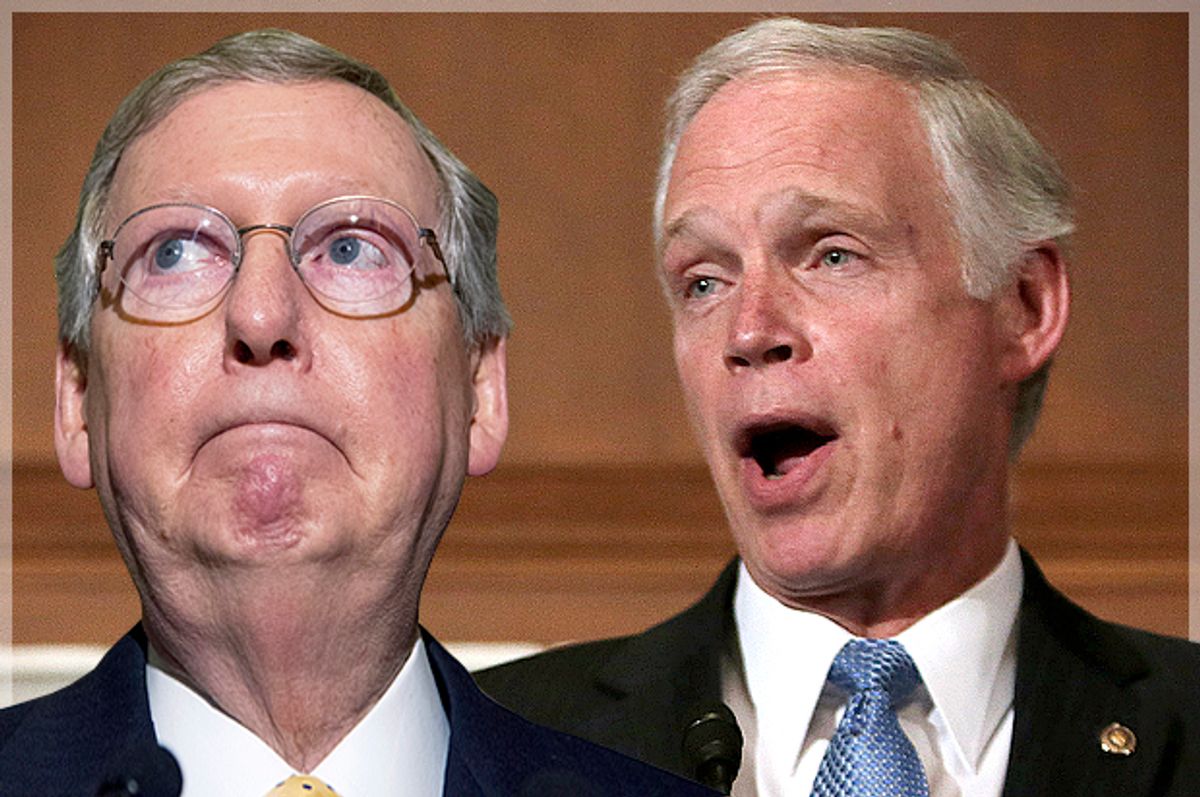Greg Sargent has been reliably tracking the GOP's farcical attempts at an Obamacare "fix" if the Supreme Court strikes down federal exchange subsidies when it decides King v. Burwell, with a ruling expected in June. Wisconsin Sen. Ron Johnson, perhaps trying to burnish his “sane” credentials in preparation for a rumored rematch with former Sen. Russ Feingold next year, has proposed extending the federal subsidies for those who already have them through December, 2016.
That presumes a new Congress, and hopefully (to Republicans) a new president, will come up with the Obamacare “replacement” the party has been promising and failing to deliver since the Affordable Care Act passed in March of 2010, which is unlikely. Johnson himself has said that the issue can be litigated via the 2016 election, which is a good idea, except we did that in 2012, and his party wouldn’t abide by the results.
Johnson’s whole proposal is kind of a joke – more on that below – but now comes word it’s a joke that probably doesn’t have much hope of winning a GOP majority.
The Hill reports that Johnson’s inadequate plan is competing with much worse “substitute” plans offered by senators to his right. And of course, the quivering tower of Jello that is the Senate GOP leadership has signed on to multiple plans.
Majority Leader Mitch McConnell supports the proposal by Johnson – as well as a competing one from right-wing Nebraska Sen. Ben Sasse, which would rely on tax credits to ease the pain of subsidy loss (but only slightly). Sen. John Barrasso, who’s leading the effort to respond to subsidy repeal, has endorsed Johnson’s plan – as well as one by good old Ted Cruz, which essentially repeals all of Obamacare.
Over in John Boehner’s House, a working group has been meeting privately, but Ways and Means Chairman Paul Ryan, normally talkative on budget issues, hasn’t weighed in on whether the group will try to provide any kind of temporary help for those who lose ACA subsidies.
"I think it will be extraordinarily difficult” to get his party to coalesce around a solution, deputy whip Rep. Tom Cole told The Hill. “That’s why I’m glad I’m just a humble appropriator.”
It’s not that Johnson’s plan is a good one. It only extends help for about 18 months, presuming the GOP will get its act together by then, when it’s had more than five years to do something and has failed. And it also only applies to those currently receiving subsidies. Roughly 4,700 people a day sign up for the ACA and receive subsidies, enrollment wizard Charles Gaba has shown. They’d get nothing. By the end of 2015, that would mean more than a half-million people denied help. A year later, they’d be joined by another 9.4 million.
Besides, as Sargent has also noted, Johnson’s proposal as currently written would repeal the individual mandate, but leave intact the prohibition on insurance companies discriminating based on pre-existing conditions. The two measures are pretty undetachable, because if insurers have to cover sick people, and healthy people don’t have to even out the pool by buying insurance, premiums will skyrocket.
Johnson’s plan shows that even a Republican who’s ostensibly trying to do the responsible thing, and avert a coverage catastrophe, doesn’t really understand the health insurance industry well enough to do so. Nonetheless, his bill has 29 GOP co-sponsors (including the feckless McConnell and Barrasso, of course), indicating his ignorance is shared by a majority of the GOP Senate majority.

Shares